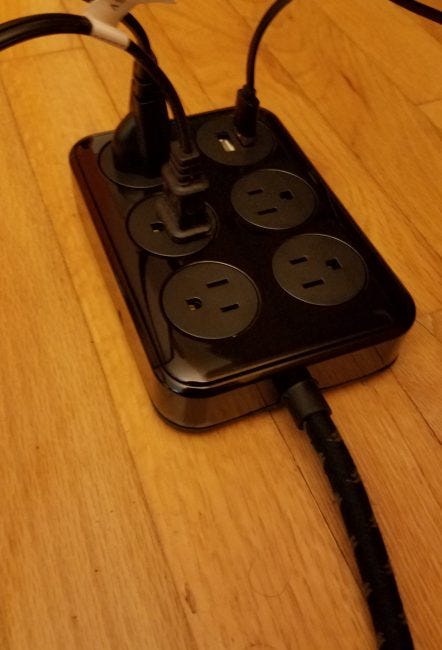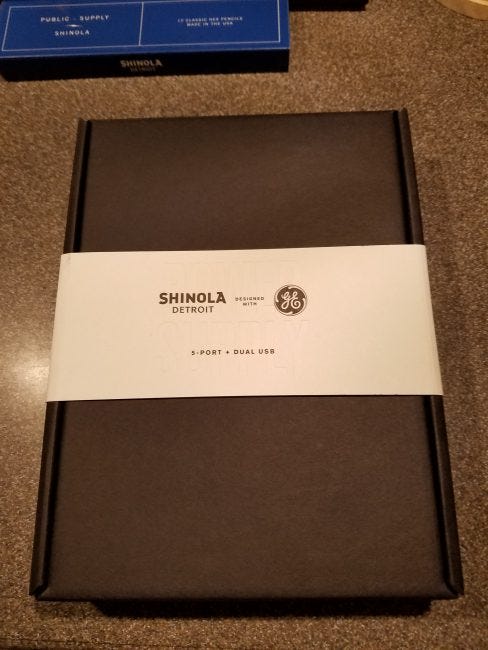Made In The USA: Shinola x General Electric

"Can't believe that you, of all people, buy into the Shinola hype." That's what a commenter wrote on my Instagram page yesterday. I think that's a compliment. And while my opinion on Shinola is, I hope, reasonably hype-free, I also can't say that I'm immune to the brand's charms.
I stopped by their Ann Arbor store late last night. This is, it has to be said, a profoundly satisfying place. The ground floor is designed around a selection of natural materials and carefully spot-lit to cast a flattering glow on everything from their boxes of traditional wooden pencils (that I bought for my son) to the handsome Runwell, Bixby, and Detroit Arrow bicycles.
The basement, reached down a set of wrought-iron-and-rough-wood stairs, is an authentic marvel. Brick-lined, with a fourteen-foot ceiling and that same careful accent lightning. A gloss-red bicycle sits between small, private alcoves for conversation. There's a bar, tended during my visit by a painfully earnest and ruggedly handsome beard-and-suspenders fellow who cleaned glasses with the precise amount of vintage, authentic effort displayed by the android bartender in Passengers, where you can buy soda and baked goods. Beneath another soft spotlight, there's a pair of bookshelf speakers and a selection of usual-suspect records (What's Going On, Rubber Soul, Physical Graffiti, that sort of thing) for you to play on their stunning new Shinola (by VPI) turntable. A great place to write a novel, meet your future wife, or just relax with a made-in-Detroit Shinola soda. At only $1.00, the twelve-ounce glass-bottled cola is probably the only genuine deal the brand offers.
Everywhere you look, you are gently confronted by the deft touch of people who are genuine masters of the visual language. I've spent a lot of time in a lot of self-consciously upscale boutiques and locations --- Loro Piana off the Miracle Mile, anyone? The pocket-sized, 170-room Ritz-Carlton Wolsfburg? Solage, in Calistoga? --- but Shinola has them all whipped for love at first sight. And if the brand's message isn't always crystal-clear and completely supported by the facts, surely it is a thousand times better than the utterly facile and insincere site design of a Ruehl or any of the other fake-ass luxury brands that peddle sweatshop goods marked up by nine hundred percent to profoundly ignorant stay-at-home ladies-who-lunch.
As educated, aware adults, of course we have to be able to look beyond the veneer of things into the reality. I've written in the past that the Shinola brand offers an outstanding path to production and sales for American craftsmen and small businesses. The "Shinola x General Electric" stuff is an excellent example of this. Who would spend $175 for an American-made extension cord, besides an utter idiot? Well, I did, last night, and I try not to be an utter idiot. In fact, I can easily make the case for it. This is something that you will use a lot, something that needs to last forever and be dependable. And in the open-plan, low-mass interior design of $THE_CURRENT_YEAR, your extension cords might actually be visible to visitors. Why not have something nice, and something that promotes employment and dignity for American workers?
This extension cord that has two brands on it --- Shinola and General Electric --- is the actual product of neither. It's made by Byrne Electrical, an existing Michigan-based electric-equipment manufacturer. Byrne opened a thirty-person satellite factory to make these plugs. There's no detailed catalogue of parts sources to be had on this plug, but after researching Byrne a bit I've concluded that they have the capability to make everything but the USB ports in-house. I worked with a supplier like this when I did my first stint at Honda in 2006; they can be remarkably ingenious people.
I like the "lean and agile" manner in which this effort was put together. There's a bit of genius to it:
Bryne hires people who did this sort of work for the automakers pre-NAFTA;
They use some cheap space abandoned by those same automakers;
Shinola licenses the General Electric brand for extra vintage-Americana mojo, probably for pennies per product;
And they use the existing Shinola boutiques and web space to sell them to people who are already sold on the idea of paying more for an American-made item.
At no point does anybody invest $100 million or list an IPO or start an independent marketing campaign. Yet the product is selling pretty well.

As you'd expect for $175, everything about the extension cord is first-rate. I particularly like the combination of 120v plugs for my three laptops and the USB plug for my phone. Only one problem: I bought the wrong one. I thought I was getting the orange five-plug model, to match the orange Natuzzi recliner I use to write in the evenings, but I accidentally grabbed the black one. So I'm going to buy the orange one as well and move the black one to my music room.
There's something more than faintly risible about the idea of a hyper-expensive extension cord, but the truth is that the market has already accepted the idea of monstrously-expensive versions of everyday items. It's just that most of them are still made by sweatshops in China, with the markup going to somebody's social-media team and somebody else's NetJet share. I'd like to live in a world where this extension cord is in Home Depots with Byrne branding and a $49 price tag, but as I said before, let's not let the perfect be the enemy of the good.
And if you want a free generic extension "octopus plug" with a flickering power light and a bad fifth port, I've got one to give away!

